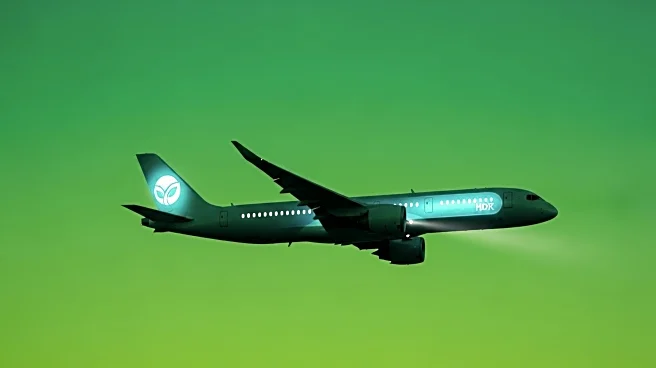What is the story about?
What's Happening?
The aviation industry is experiencing a delay in the adoption of hydrogen propulsion systems, affecting several ambitious research projects. Airbus announced a postponement in the timeline for its hydrogen-powered ZEROe airliner, citing technology and infrastructure concerns. This decision has led to a ripple effect across the sector, prompting companies like GKN Aerospace to reassess their investment strategies. GKN, which had been developing multiple hydrogen propulsion systems, has decided to reduce its focus on certain projects, including the HyFIVE initiative, due to the extended timeline and alignment with Airbus's plans. Despite these setbacks, GKN remains committed to hydrogen in the long term, continuing work on projects like H2GEAR and H2FlyGHT, albeit with a reduced scope.
Why It's Important?
The delay in hydrogen adoption by major players like Airbus has significant implications for the aviation industry's efforts to transition to greener technologies. Hydrogen is seen as a promising zero-emission energy source, capable of powering both short- and long-haul aircraft. The postponement affects research funding and prioritization, potentially slowing the pace of innovation in sustainable aviation. Companies and funding bodies must now navigate the challenge of balancing investment in mid- and long-term technology bets, while maintaining momentum in current-generation aircraft production. The industry's ability to meet environmental goals and reduce carbon emissions hinges on the successful development and deployment of hydrogen technologies.
What's Next?
As the industry adjusts to the revised timeline, stakeholders are likely to focus on smaller, domestic aircraft for initial hydrogen adoption. The UK’s Aerospace Technology Institute (ATI) continues to invest in hydrogen-related projects, emphasizing the development of critical technologies like fuel distribution and storage systems. The ATI's strategy involves supporting research that can unlock the potential of hydrogen flight in the future. Meanwhile, Airbus's continued work on hydrogen, including the ZEROe Development Centre project, indicates ongoing commitment to zero-emission technologies. The industry must address commercialization barriers and bridge the economic gap for transitioning to hydrogen-powered aircraft.
Beyond the Headlines
The delay in hydrogen adoption highlights the complexities of transitioning to sustainable aviation technologies. Ethical and environmental considerations are at play, as the industry seeks to balance immediate efficiency gains with long-term sustainability goals. The decision-making process involves weighing technological maturity, commercial viability, and alignment with private sector priorities. The broader implications include potential shifts in research funding, industry collaboration, and government policy, as stakeholders strive to achieve a greener future for aviation.














